The Fastest Ways to Hydrate Your Body Efficiently

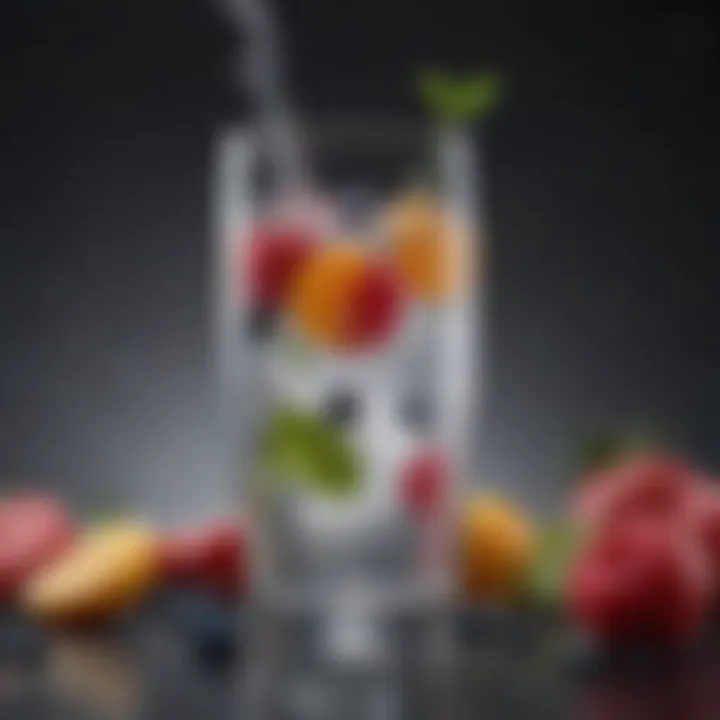
Intro
Hydration is essential for maintaining overall health and well-being. Water makes up about 60% of the human body and supports numerous physiological functions. It regulates temperature, transports nutrients, and removes waste. Ensuring the body is adequately hydrated can impact cognitive performance and physical endurance.
Despite the importance of hydration, many people struggle to meet their daily fluid needs. This article explores effective methods for quick hydration, offering practical tips to incorporate these habits into daily life. By understanding different hydration techniques and the influence of dietary choices, individuals can enhance their hydration practices and improve their health.
Key Points to Discuss
- The physiological significance of hydration.
- Fast methods for achieving optimal hydration.
- Dietary choices that support hydration.
- Practical tips for maintaining hydration in daily life.
These aspects will provide a thorough understanding of how to efficiently fulfill hydration needs.
Understanding Hydration
Hydration is more than simply drinking water; it is a complex physiological process essential for maintaining overall health. Understanding hydration can lead to better choices around fluid intake, which is vital, especially for those pursuing an active lifestyle or navigating extreme environmental conditions. Health professionals agree that proper hydration affects everything from physical performance to cognitive function. It is about finding a balance that supports various bodily functions.
What Hydration Means for the Body
Hydration refers to the body's ability to maintain adequate fluid levels to support cellular functions and metabolic processes. When the body is well-hydrated, blood volume is stable, which facilitates nutrient transport and the removal of waste. This balance is vital for maintaining thermoregulation, ensuring the body can manage heat effectively. Often, people underestimate the significance of hydration, viewing it as a mere supplement to their daily diet. In reality, optimal hydration serves as the cornerstone of physical performance and health.
The Importance of Water
Water is the most critical element for life. The body is made up of approximately 60% water. Each cell requires water to function correctly. When you consume water, it aids in digestion, absorbs nutrients, and helps in the elimination of waste products. Hydration enhances not only physical capabilities but also mental acuity. For individuals engaged in demanding tasks or sports, effective hydration translates to better reaction times and concentration. Lack of water drastically reduces these capabilities, emphasizing the need to drink regularly throughout the day.
Consequences of Dehydration
Dehydration occurs when the body loses more fluid than it takes in. This condition can lead to numerous health issues, including fatigue, headaches, and reduced physical performance. Severe dehydration can result in heat-related illnesses, kidney problems, and even cognitive impairment. Symptoms can vary in severity and may include:
- Dry mouth
- Thirst
- Decreased urine output
- Dizziness
- Confusion
It is crucial to recognize these signs early. Dehydration can emerge from various factors such as hot weather, physical activity, and even certain illnesses. Addressing hydration proactively ensures better overall function and health.
Physiology of Hydration
Hydration is not just about drinking water. It's about understanding how our bodies function and how we can optimize our hydration for better health. The physiology of hydration concerns how the body takes in water and how it manages to utilize it effectively. When discussing hydration, it is essential to recognize that every cell in our body requires water to function correctly.
Proper hydration aids in digestion, temperature regulation, and even cognitive functions. Thus, knowing the mechanisms behind hydration allows us to implement practices that provide the most benefit.
How the Body Absorbs Water
Water absorption primarily occurs in the intestines. Once ingested, water passes through the stomach before entering the small intestine. It is here that the greatest quantity of water is absorbed into the bloodstream. The intestines are lined with absorptive cells, which facilitate the movement of water. This process is influenced by various factors, including the concentration of solutes in the intestines and the presence of specific carrier proteins.
The speed of absorption can depend on how quickly water is consumed and other factors like the temperature of the water. Cold water may take longer to absorb than room temperature water. Moreover, drinking water along with a meal can alter absorption rates, as food needs time to break down to allow for efficient absorption.
Factors Affecting Hydration Levels
Various factors can influence how hydrated one remains throughout the day. These can be categorized into internal and external factors.
- Activity Level: Higher levels of physical activity increase water loss through sweat and respiration.
- Environmental Conditions: Hot and humid climates can elevate perspiration rates, necessitating increased water intake.
- Diet: Sodium intake can notably impact hydration. A high-salt diet can lead to water retention, while insufficient salt can trigger dehydration.
- Age and Health Conditions: Older adults may experience decreased thirst signals, making them more prone to dehydration. Certain health conditions, such as diabetes, can also affect hydration needs and absorption.
Understanding these factors is key to addressing hydration needs effectively.
The Role of Electrolytes
Electrolytes are minerals that dissolve in water and carry an electric charge. Sodium, potassium, magnesium, and calcium are all examples of these vital components. They are crucial for various bodily functions, including maintaining fluid balance and nerve function.

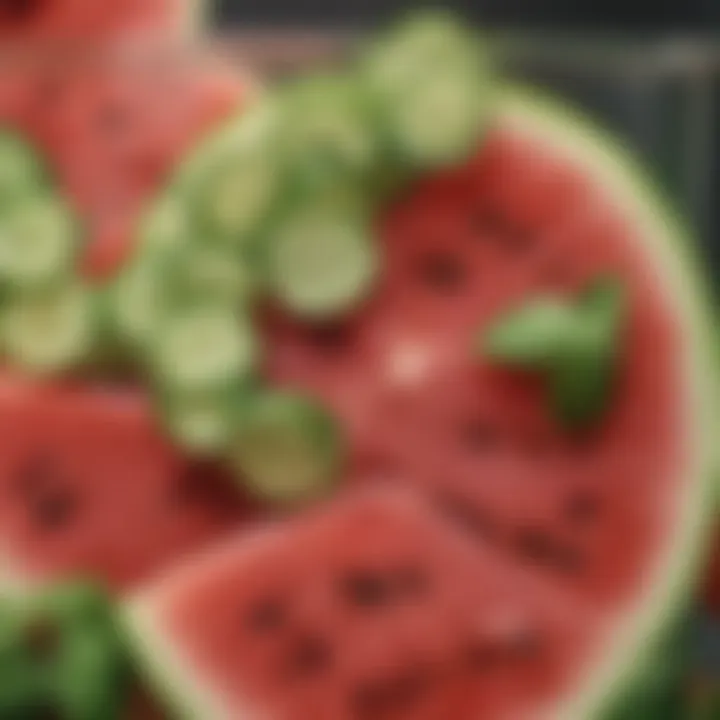
When we sweat, we lose not only water but also electrolytes. Replacing these is fundamental in maintaining optimal hydration. An imbalance of electrolytes can affect muscle function and lead to fatigue or cramps during physical exertion.
In situations of heavy sweating, such as during strenuous exercise or hot weather, rehydration should ideally include both water and electrolytes. This can be achieved through various means, including electrolyte drinks or foods rich in these minerals.
"Hydration is more than just water. It’s a delicate balance of fluids, electrolytes, and the body's responses to needs and signals."
In summary, understanding the physiology of hydration equips individuals with the knowledge to make informed choices about their hydration practices. By appreciating how the body absorbs water, recognizing factors that affect hydration levels, and acknowledging the role of electrolytes, one can take significant steps toward achieving proper hydration.
The Quickest Methods to Hydrate
Hydration is essential for maintaining bodily functions. This section outlines practical and quick strategies for staying hydrated. Given the various ways our bodies lose water, understanding these methods ensures we can replenish effectively. In a fast-paced world, the quickest ways to hydrate are beneficial for everyone, from busy professionals to athletes.
Optimal Hydration Techniques
Optimal hydration starts with drinking water. However, timing and techniques matter. Sipping water regularly throughout the day is generally more efficient than consuming large quantities at once. Aim for at least eight 8-ounce glasses daily, but listen to your body as individual needs can vary. Carrying a reusable water bottle prompt you to drink consistently.
Another technique involves using apps to remind you to hydrate. Several apps can track your fluid intake. They prompt you when it’s time for a drink, ensuring you stay on track. Moreover, portioning drinks can also help. Instead of refilling your 1-liter bottle, try breaking it down into smaller units. For instance, drink two 500-milliliter bottles instead. This approach gives you a clear picture of your intake.
Infused Waters and Their Benefits
Infused waters provide a flavorful alternative to plain water. Adding fruits, herbs, or vegetables enriches the water, making it more appealing. Common combinations include lemon and mint or cucumber and basil. These flavors not only improve taste but add essential vitamins and nutrients.
Infused waters can encourage more frequent drinking. They act as an incentive for those who typically struggle to meet hydration goals. Additionally, they contribute to overall health. For example, lemon-infused water provides vitamin C, while cucumber adds hydration without many calories.
"Switching to infused water can make a significant difference in your daily hydration habits."
Hydration Through Food Choices
Food plays an integral role in hydration. Certain foods help the body retain water due to their high water content. Watermelon, cucumbers, oranges, and strawberries are excellent examples. Incorporating these into daily meals boosts hydration levels, especially when consumed throughout the day.
In addition to fruits, vegetables such as lettuce and celery are beneficial. Salads can serve multiple purposes: they are nutritious and can increase overall water intake. Consuming soups and broths is another effective strategy. Broth-based meals not only hydrate but also offer electrolytes, enhancing hydration further.
Hydration Products and Supplements
In pursuit of optimal hydration, various products and supplements have emerged as practical tools to enhance our fluid intake. Understanding their roles is essential for anyone wanting to maintain effective hydration in their daily life. These products can offer convenience and targeted benefits, making it easier to meet hydration needs.
Electrolyte Drinks
Electrolyte drinks are formulated beverages designed to replenish minerals lost during physical activity or perspiration. They contain key electrolytes such as sodium, potassium, and magnesium. These minerals are vital for various bodily functions, including fluid balance, muscle function, and nerve transmission.
Benefits of Electrolyte Drinks:
- They help restore lost electrolytes quickly, especially after intense exercise.
- They improve performance and endurance during workouts.
- They can enhance rehydration more effectively than plain water alone.
While selecting an electrolyte drink, it is important to check the sugar content. Some commercial options may contain high levels of added sugars, which can counteract the benefits.
Hydration Tablets
Hydration tablets are compact and convenient solutions for improving water intake. These tablets dissolve in water to create an electrolyte-rich beverage without the bulk typically associated with other products. Their portable nature makes them an excellent choice for on-the-go hydration.
Considerations for Hydration Tablets:
- They are typically low in calories, making them a smart option for those monitoring their intake.
- Availability of diverse flavors can make hydration more enjoyable.
- Be sure to opt for products without unnecessary additives or artificial ingredients.
Many people find that hydration tablets can easily fit into their busy lifestyles without compromising nutritional quality.
Homemade Hydration Solutions
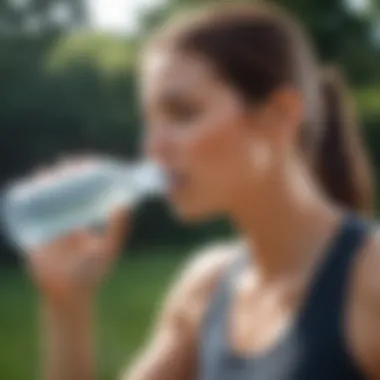
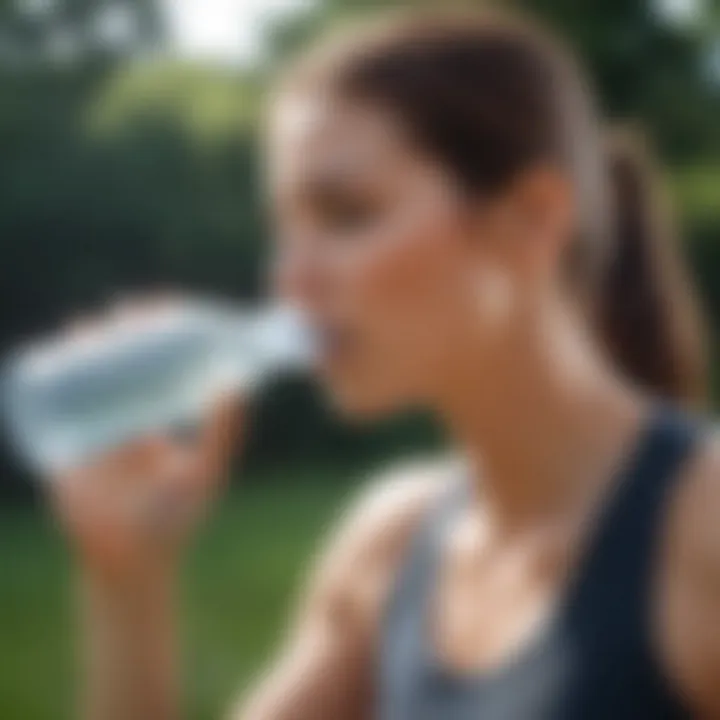
Creating hydration solutions at home allows for complete control over ingredients and their nutritional profiles. Homemade options can be flavorful and tailored to personal taste preferences. One popular method is to mix water with a pinch of salt and a splash of citrus juice—this simple blend can effectively mimic commercial electrolyte drinks.
Recipe for a Basic Homemade Electrolyte Drink:
Combining these elements not only hydrates the body but also offers vitamins and minerals. Additionally, one can incorporate herbal teas, coconut water, or fruit-infused waters for more variety and flavor.
A well-planned hydration strategy combines both commercial products and homemade solutions, tailored to individual preferences and needs.
In summary, hydration products and supplements play a crucial role in maintaining optimal fluid levels. From electrolyte drinks to hydration tablets, and especially homemade solutions, they provide practical approaches to meet nutritional needs effectively. Each option carries unique benefits and considerations, allowing for flexibility tailored to one’s lifestyle.
Hydration Strategies for Different Lifestyles
The concept of hydration is not one-size-fits-all. Understanding hydration strategies for various lifestyles is crucial for maintaining optimal health. Different people face different challenges when it comes to staying hydrated, influenced by their activities, environments, and personal health conditions. Adopting specific hydration practices is essential for ensuring that hydration supports overall wellness effectively.
Hydration for Athletes
For athletes, hydration goes beyond simply drinking water. Fluid loss through sweat can vary widely depending on the intensity of the activity and environmental conditions. Athletes must, therefore, develop a tailored hydration plan. A good approach is to consume water before, during, and after workouts. Additionally, incorporating electrolyte drinks can replenish lost minerals.
Here are a few key considerations for athletes:
- Pre-exercise hydration: Aim to drink about 500 ml of water at least two hours before exercising.
- During exercise: Ingest small amounts frequently, about 150-200 ml every 15-20 minutes, depending on the length and intensity of the activity.
- Post-exercise recovery: Rehydrate with both water and electrolyte-rich fluids to recover losses.
Practicing these strategies helps athletes to enhance performance, delay fatigue, and reduce the risk of heat-related illnesses.
Hydration in Hot Climates
Living or working in hot climates presents unique hydration challenges. High temperatures increase the body's need for fluids. Individuals in such environments must recognize the signs of dehydration, which can include dryness of mouth, thirst, and dark urine. One effective strategy is to carry a water bottle at all times. This makes it easier to drink more frequently.
Moreover, it’s important to plan fluid intake around outdoor activities during the hottest parts of the day. Here are some tips for staying hydrated in hot climates:
- Regular water intake: Aim for at least 2-3 liters of water daily, increasing as temperatures rise and activity levels increase.
- Cool down efficiently: Drink cold fluids to help lower body temperature after exposure to heat.
- Avoid diuretics: Limit consumption of caffeinated and alcoholic beverages, as they can lead to increased fluid loss.
Staying Hydrated During Illness
Illness often leads to an increased risk of dehydration, particularly with conditions that involve fever, vomiting, or diarrhea. Staying hydrated during illness can be challenging yet vital for recovery. Consuming adequate fluids helps maintain body function and can support the healing process.
It is essential to choose appropriate fluids, which can include:
- Electrolyte-containing drinks: These can help replace lost minerals due to illness.
- Clear soups and broths: They are nourishing and can soothe the digestive system while keeping hydration levels up.
- Increased water intake: Whenever possible, drink more water throughout the day.
In cases of severe dehydration, it is advisable to seek medical attention. Monitoring symptoms closely can guide better hydration practices for improved health during illness.
Staying hydrated can be simple, yet very effective in maintaining health across various lifestyles. Each group has unique needs, but awareness and planning can ensure proper hydration.
Hydration and Dietary Considerations
Understanding the relationship between hydration and diet is essential for maintaining optimal health. Food choices significantly impact hydration levels. Balancing liquid intake and solid foods can influence not only hydration but also overall well-being. By acknowledging this connection, individuals can develop effective strategies to meet their hydration needs.
Balance Between Water and Solid Foods
Eating solid foods is a significant contributor to overall hydration. Many foods contain substantial amounts of water. For instance, foods like soup, yogurt, and fruits can contribute to daily fluid intake. It is essential to recognize that hydration is not solely dependent on drinking water. In fact, a varied diet rich in moisture can aid in balancing fluid levels in the body.
Including the right proportions of water-rich foods can provide multiple benefits. For example, incorporating cucumbers, lettuce, and watermelon boosts hydration while also providing essential nutrients. A simple approach is to ensure that meals consistently contain a variety of these foods. Planning meals with hydrating elements promotes better hydration overall.
"The human body is composed of approximately 60% water, thus emphasizing the need for adequate hydration through both fluids and foods."
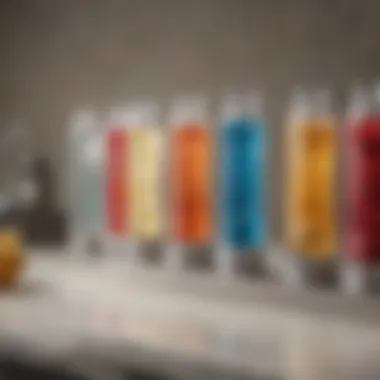
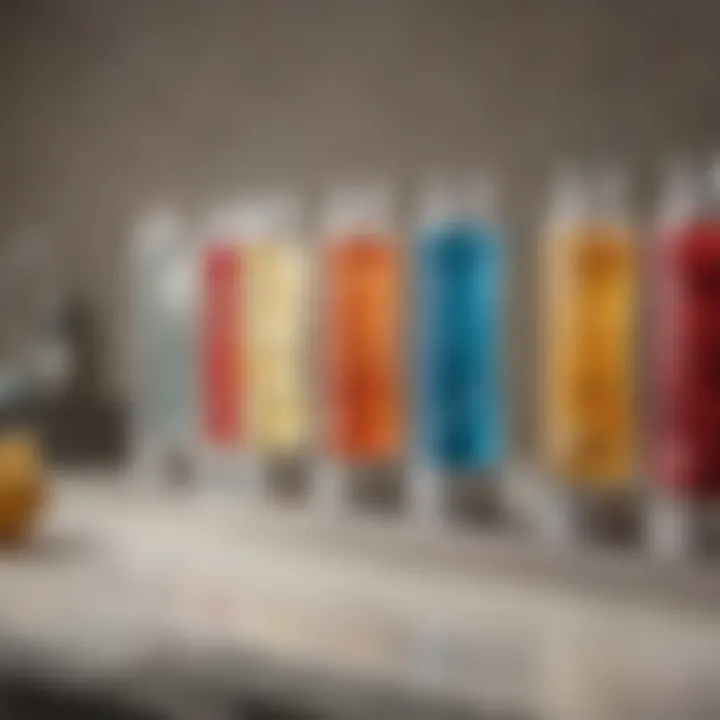
Caffeinated and Alcoholic Beverages
Caffeinated and alcoholic beverages are often viewed with caution regarding hydration. While these drinks can be enjoyable, they may not always contribute positively to hydration status. Caffeine is a diuretic, which means it can increase urine production, potentially leading to dehydration if consumed excessively. However, moderate coffee and tea consumption generally does not pose a significant risk for hydration for most people.
On the other hand, alcohol can have a more profound impact on hydration. It disrupts the body's balance and can lead to dehydration. It is advisable to consume alcoholic drinks in moderation. Additionally, pairing alcoholic beverages with water can mitigate some of their dehydrating effects. Paying attention to drink choices can significantly influence hydration levels.
Fruits and Vegetables High in Water Content
Incorporating fruits and vegetables with high water content into the diet is a practical strategy for hydration. Foods like oranges, strawberries, and spinach are not only refreshing but also hydrating. These foods are low in calories and can serve as excellent snacks throughout the day.
Including a variety of these options encourages good hydration habits. Eating these foods regularly can lead to improved hydration, especially in environments where active hydration is crucial. Some suggested fruits and vegetables to focus on include:
- Watermelon
- Cucumber
- Celery
- Zucchini
- Grapefruit
- Peaches
By understanding the significance of hydration and dietary choices, individuals can create a more balanced approach to their nutrition. This proactive strategy helps maintain hydration and supports overall health.
Monitoring Hydration Levels
Monitoring hydration levels is essential for maintaining overall health and well-being. Understanding one's hydration status can prevent the adverse effects of dehydration and ensure that the body operates optimally. For many, hydration might seem a straightforward matter of drinking water, but the nuances of how much and when to hydrate are crucial. A lack of proper monitoring may lead to confusion, insufficient hydration, or excessive water intake, leading to potential health risks.
Regularly observing hydration levels allows individuals to recognize their unique requirements based on activity, climate, and personal health factors. Tracking hydration can be empowering and lead to better health choices. When consistently monitored, hydration can enhance mental clarity, physical performance, and even mood stability.
Recognizing Signs of Dehydration
Being able to identify the signs of dehydration is foundational for effective hydration management. Common symptoms include:
- Thirst: This is often the first signal your body gives. By the time you feel thirst, you might already be slightly dehydrated.
- Dark Urine: Urine color is a good indicator. Dark yellow typically signals a need for more fluids, while pale yellow indicates appropriate hydration.
- Fatigue: Feeling tired or sluggish can indicate low fluid levels in the body.
- Dry Mouth and Skin: These visible signs often highlight a need for hydration as well.
- Headaches: Often, dehydration is a contributing factor to recurring headaches.
Recognizing these signs allows for timely intervention to prevent deeper dehydration, enhancing overall health.
Tools for Tracking Hydration
There are various tools and methods available for tracking hydration levels, each suited to different preferences:
- Hydration Apps: There are smartphone applications designed for tracking daily water intake, offering reminders and visual cues.
- Smart Water Bottles: These innovative products can track your consumption and sync with your mobile devices, providing real-time updates.
- Manual Tracking: Keeping a simple log or journal can be effective, letting individuals jot down their daily fluid intake.
Using one or multiple tools can help in establishing a consistent hydration habit. Regular checks ensure that fluid intake meets the body's changing needs.
Establishing Hydration Goals
Setting clear hydration goals can create a more conscious approach to fluid intake. Individuals may consider the following elements while establishing these goals:
- Personal Needs: A general guideline is eight 8-ounce glasses of water per day, but individual needs may vary based on factors like exercise intensity, the climate, and health conditions.
- Activity Level: Those who engage in rigorous activities should drink extra fluids to replace losses through sweating.
- Body Weight: A common rule is to drink half an ounce of water for every pound of body weight.
By defining concrete hydration goals, individuals can enhance their wellness while preventing dehydration.
In summary, monitoring hydration levels entails not just the act of drinking water but actively managing one's fluid status. Recognizing the signs of dehydration, utilizing tracking tools, and setting personalized hydration goals are critical steps in achieving optimal health outcomes.
Ending
Incorporating hydration into daily routines, through both beverages and food, ensures that the body's needs are consistently met. The convenience of electrolyte drinks and hydration tablets can serve as swift solutions when immediate hydration is required. Additionally, recognizing the signs of dehydration allows individuals to respond promptly to their body's needs, maintaining an adequate balance of fluids. Lastly, having established hydration goals is crucial, as it motivates consistent implementation of these practices in everyday life.
Recap of Key Points
- Understanding Hydration: Water plays a vital role in bodily functions, and dehydration can have serious consequences.
- Hydration Methods: Quick hydration can be achieved via optimal techniques, infused waters, and nutrient-rich foods.
- Hydration Products: Utilizing products like electrolyte drinks can effectively restore hydration levels.
- Lifestyle Considerations: Tailoring hydration strategies to fit various lifestyles, including athletic needs, hot climates, or illness, is critical.
- Monitoring and Goals: Being aware of hydration levels and setting personal goals can enhance overall hydration awareness.
Final Thoughts on Hydration
Effective hydration is not just about drinking water. It requires a comprehensive approach that blends liquid intake with dietary choices and lifestyle considerations. Remember, staying hydrated is a daily commitment. Engaging in mindful hydration practices can significantly improve energy levels, mood, and overall health.
"Hydration is the key to maintaining energy during physical activity and daily living."
The pursuit of optimal hydration should be a priority for everyone. By adopting the habits discussed, individuals can ensure they meet their hydration needs and thrive.



